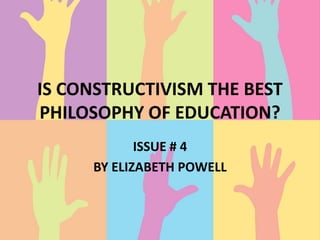
Is constructivism the best philosophy of education
- 1. IS CONSTRUCTIVISM THE BEST PHILOSOPHY OF EDUCATION? ISSUE # 4 BY ELIZABETH POWELL
- 2. Image source page: http://constructivism512.pbworks.com/w/page/16397299/Constraints-of-Constructivism
- 3. “Constructivism is the recognition that reality is a product of human intelligence interacting with experience in the real world. As soon as you include human mental activity in the process of knowing reality, you have accepted constructivism.” – David Elkind
- 4. Background • Constructivism – Reality exists as a construct of the mind – Thus, reality is a function of perception and is subjective • What this means is – – Constructivists believe that what the human mind “constructs” a reality based on perception. – This reality construction depends both on properties of the object AND mental activities of a person (Elkind, 2005). – Therefore, different people may experience reality differently.
- 5. Properties of a Constructivist Curriculum • “Students construct understanding based on past and present experiences.” (Elkind, 2004) • Collaborative learning encouraged • Students are actively engaged in designing learning experiences for themselves • Students have a major role in deciding what is learned • Fosters critical and creative thinking • Multiple types of assessment utilized
- 6. Debate Point: SHOULD CONSTRUCTIVISM BE THE PRIMARY PHILOSOPHY OF EDUCATION?
- 7. Proponents of Constructivism • David Elkind, Jean Piaget, Lev Vygotsky – David Elkind (2004)reports that technology is inducing educational reform and that a philosophy of education must be chosen to best meet the needs of the students
- 8. Proponents of Constructivism • Elkind supports constructivism because it encourages students to be critical thinkers, involves students in the learning process, and requires students to apply knowledge to new situations.
- 9. Proponents of Constructivism • Elkind reports that three types of readiness are needed in order for constructivism to be successfully implemented: – Teacher readiness – Curricular readiness – Societal readiness • He indicates that the reason that constructivist educational reform has not been overly successful lies in these factors.
- 10. Teacher Readiness and Constructivism • Problems exist with teacher training – Teachers do not know how to incorporate constructivist theory into teaching – Teachers have difficulty translating activities into learning objectives – Curriculum is often test-driven – A gap exists between what is being taught in universities and what teachers need to know
- 11. Curricular Readiness and Constructivism • Constructivist approach requires a thorough understanding of curriculum to be taught • Content must match developmental level
- 12. Societal Readiness and Constructivism • Educational policy makers and society in general have not accepted constructivism • No Child Left Behind is incompatible with constructivist theory
- 13. Opponents of Constructivism • Objectivism is opposing view – One reality exits independent of anyone perceiving it – Humans know this reality only through reasoning – Reality is objective; that is, there is one reality independent of perception – Logic and reason are central themes – http://www.youtube.com/watch?v=7ukJiBZ8_4k – interview with Ayn Rand (founder of objectivism) In this picture: Ayn Rand. Image source page: http://salem-news.com/articles/january072010/aun_rand_dj.php
- 14. Opponents of Constructivism • Jamin Carson, Ayn Rand – Objectivism is more reasonable than constructivism – “Objectivists do not consider prior knowledge or cognitive structures as a subjective lens through which one views reality.” (Carson, 2005)
- 15. Opponents of Constructivism • Carson argues that constructivism is inherently flawed because the teacher must decide what is important and thus what will be taught – Implies that some knowledge is more important than other knowledge, which, according to Carson, is in violation of constructivist principles
- 17. Features of An Objectivist Curriculum • Instruction is teacher-centered • Focus is on direct instruction • Assessment more likely to be through examination • Knowledge transferred from teacher to learner • Less collaborative learning
- 18. Summary • Constructivists like David Elkind believe that constructivism is the best philosophy of education because it is learner-centered, focuses on application of knowledge, and fosters critical thinking. Objectivists, such as Jamin Carson, feel that constructivism is not the best philosophy of education. Objectivists maintain that all information is present independent of the learner and knowledge is best imparted from the more experienced to the less experienced. Logic and reasoning are central themes, and objectivists deny that knowledge is constructed, to any degree, by the learner. I believe that the best philosophy is a “modern constructivism” (which some objectivists argue does not exist). I feel that, when too radical, constructivism can be counterproductive. Reality does exist outside of the individual, but our perception of that will be different based upon past experiences, world view, and prior knowledge. I agree with Cronjé (2006) that some principles from each philosophy could be combined to create a curriculum, but overall my viewpoint is more aligned with constructivism.
- 19. References Carson, J. (2005). Objectivism and Education: A Response to David Elkind’s ‘The Problem with Constructivism’. The Educational Forum, 69, 232-238. Cronjé, J. (2006). Paradigms Regained: Toward Integrating Objectivism and Constructivism in Instructional Design and the Learning Sciences. Educational Technology Research and Development, 54 (4), 387-416. Elkind, D. (2004). The Problem with Constructivism. The Educational Forum, 68, 306-312. Elkind, D. (2005). Response to Objectivism and Education. The Educational Forum, 69, 328-334. Noll, J. (2011). Taking Sides: Clashing Views on Educational Issues (16th ed.). New York: McGraw-Hill.
